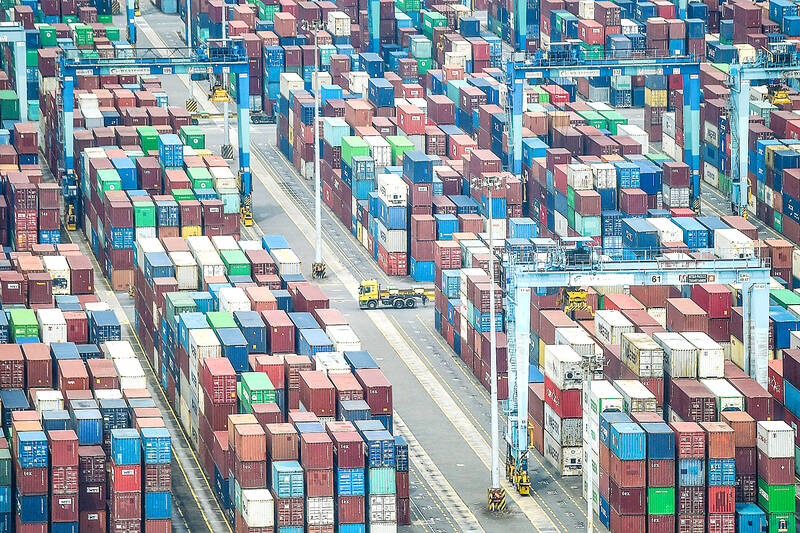Malaysia has urged Chinese companies to refrain from using it as a base to “rebadge” products to avoid US tariffs, Malaysian Deputy Minister of International Trade and Industry Liew Chin Tong (劉鎮東) said yesterday, amid increasing export restrictions and concerns of a US-China trade war.
Washington is expected to further curb exports to Chinese semiconductor toolmakers and sales of certain chipmaking equipment, including products manufactured in Malaysia, Singapore and Taiwan, sources have said.
Malaysia is a major player in the semiconductor industry, accounting for 13 percent of global testing and packaging, and is seen as well-placed to grab further business in the sector as Chinese chip firms diversify overseas for assembling needs.

Photo: AFP
“Over the past year or so ... I have been advising many businesses from China not to invest in Malaysia if they were merely thinking of rebadging their products via Malaysia to avoid US tariffs,” Liew told a forum.
He did not specify the types of businesses.
Liew said regardless of whether the US had a Democratic or Republican administration, the world’s largest economy would impose tariffs, as seen in the solar panel sector.
Washington imposed tariffs on solar exports from Vietnam, Thailand, Malaysia and Cambodia — home to factories owned by Chinese firms — last year and expanded them in October following complaints from manufacturers in the US.
US president-elect Donald Trump has threatened to slap an additional 10 percent tariff on all Chinese imports when he takes office on Jan. 20.

Nvidia Corp chief executive officer Jensen Huang (黃仁勳) on Monday introduced the company’s latest supercomputer platform, featuring six new chips made by Taiwan Semiconductor Manufacturing Co (TSMC, 台積電), saying that it is now “in full production.” “If Vera Rubin is going to be in time for this year, it must be in production by now, and so, today I can tell you that Vera Rubin is in full production,” Huang said during his keynote speech at CES in Las Vegas. The rollout of six concurrent chips for Vera Rubin — the company’s next-generation artificial intelligence (AI) computing platform — marks a strategic

Enhanced tax credits that have helped reduce the cost of health insurance for the vast majority of US Affordable Care Act enrollees expired on Jan.1, cementing higher health costs for millions of Americans at the start of the new year. Democrats forced a 43-day US government shutdown over the issue. Moderate Republicans called for a solution to save their political aspirations this year. US President Donald Trump floated a way out, only to back off after conservative backlash. In the end, no one’s efforts were enough to save the subsidies before their expiration date. A US House of Representatives vote

REVENUE PERFORMANCE: Cloud and network products, and electronic components saw strong increases, while smart consumer electronics and computing products fell Hon Hai Precision Industry Co (鴻海精密) yesterday posted 26.51 percent quarterly growth in revenue for last quarter to NT$2.6 trillion (US$82.44 billion), the strongest on record for the period and above expectations, but the company forecast a slight revenue dip this quarter due to seasonal factors. On an annual basis, revenue last quarter grew 22.07 percent, the company said. Analysts on average estimated about NT$2.4 trillion increase. Hon Hai, which assembles servers for Nvidia Corp and iPhones for Apple Inc, is expanding its capacity in the US, adding artificial intelligence (AI) server production in Wisconsin and Texas, where it operates established campuses. This

US President Donald Trump on Friday blocked US photonics firm HieFo Corp’s US$3 million acquisition of assets in New Jersey-based aerospace and defense specialist Emcore Corp, citing national security and China-related concerns. In an order released by the White House, Trump said HieFo was “controlled by a citizen of the People’s Republic of China” and that its 2024 acquisition of Emcore’s businesses led the US president to believe that it might “take action that threatens to impair the national security of the United States.” The order did not name the person or detail Trump’s concerns. “The Transaction is hereby prohibited,”